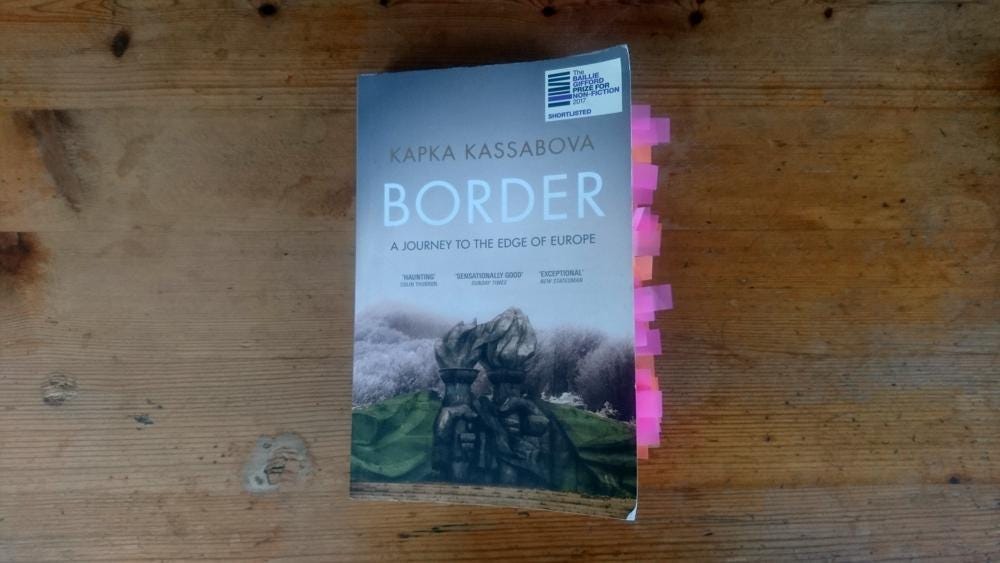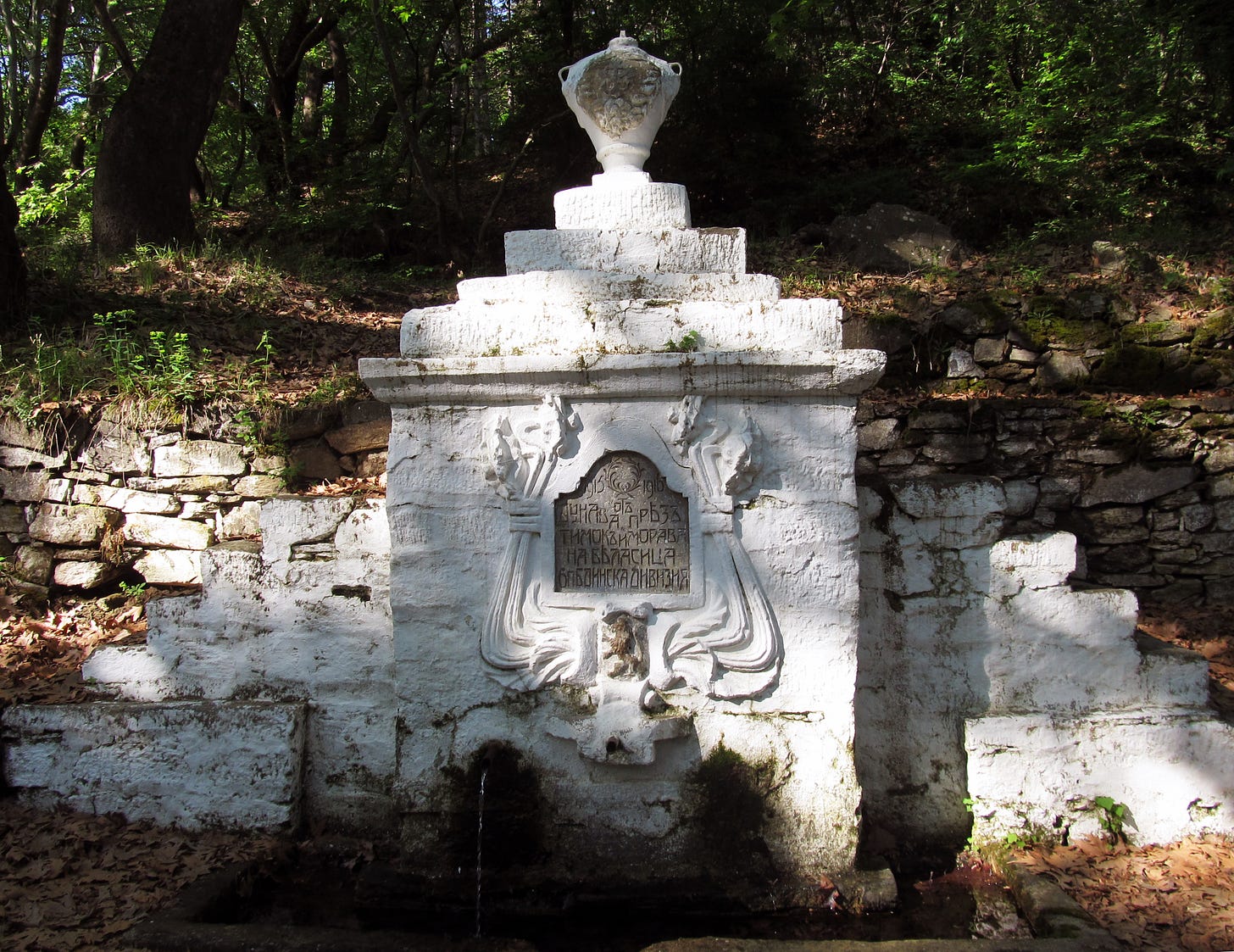FIRST LINE
This book tells the human story of the last border of Europe.

FROM THE BLURB
When Kapka Kassabova was a child, the fragile border zone between Bulgaria, Turkey and Greece swarmed with soldiers, spies and fugitives seeking to cross from East to West. … Here Kassabova journeys to meet the people of this border - treasure hunters and guards, entrepreneurs and psychic healers, refugees and smugglers - tracing the physical and psychological borders that intersect its villages and mountains, seeking out the stories that will unlock its secrets.
EXCERPTS
1. ‘West Berlin was hell’
‘West Berlin was hell. It was nothing like what I’d imagined. I was used to a nanny state where all your needs were taken care of.’
Even the ones you didn’t have, such as staying put.
‘Exactly. They took care of you full stop. Someone was always watching you. Not in the West. Nobody gave a shit. And the shops, the lights, the crowds. I went into shock.’
2. When we have an explanation for everything
‘And no, we weren’t drunk.’ Mr N. smiled. ‘This is a spiritual mountain. Some things you can’t explain, and maybe just as well.
He had a point. It is when we have an explanation for everything that we begin to feel reduced, plundered. And the people of Strandja had been plundered in every way except this. No one could take this away from them.
3. Collective fate
Writing about the psyche, Carl Jung said that ‘when an inner situation is not made conscious, it appears outside as fate’. Perhaps the ball of fire was Strandja’s way of manifesting collective fate.
4. In revenge for some old insult
Rivers thundered under, and sometimes over, bridges. Pink orchards blossomed, and rubbish lay strewn on the sides of the east-west motorway, as if every traveller had chucked out a plastic bottle in revenge for some old insult.
5. Two kinds of religious experience
‘There are two kinds of religious experience. Experiential, when you personally have an ecstatic or mystical experience. And canonical, when someone tells you what to think and believe, and you bleat in agreement, moving with a large herd. Ancient cultures were all about the former. And all the troubles of the world today come from the latter.’
6. The secret is to have three hearts
‘The secret is to have three hearts. One for loving people. Another for loving yourself. And the third one, to love the mountains.’
7. Wear a nappy and run for your life
‘Is it true what those tourist boards instruct you, that when you see a bear you lie on the ground and pretend to be dead?’
They burst out laughing.
‘And when the bear starts pawing you and you suddenly spring to life, then what?’ Jones said.
‘The instructions are: wear a nappy and run for your life,’ Ziko said. ‘Works for me every time.’
8. The unmixing of peoples
Here, you could look across this city of minarets, nod to the ghost of cosmopolitanism, and wonder: if the mixing of peoples was the order of empires and the ‘unmixing of peoples’ the order of nation-states, what’s on the horizon? … Perhaps the insidious hybrid warfare of our times will have one upside: a new remixing of peoples. Or was the wine making me too optimistic?
9. Every stone
‘Every stone must have its place, and my place is here.’
NEW WORDS
Metonymy
The clearing was known as The Homeland, a real feat of metonymy.
In extended use: a thing used or regarded as a substitute for or symbol of something else. OED
Theophany
‘Theophany,’ Marina said. ‘The belief that icons are human manifestations of gods and so mediators between the mortal and the divine.’
A manifestation or appearance of God or a god to man. OED
Cheshma
From the Turkish çeşme. The pan-Balkan roadside drinking fountain where you tie your horse, fill your goatskin with water, slice a watermelon, drop your rubbish in the vicinity of the public bin.

Zmey
In Slavic folk mythology, a shape-shifting dragon that embodies protection and possession. … It travels across space and time as a ball of fire and can manifest in a male or female form. Each village once had its own zmey, who looked after harvests and other seasonal affairs. But the other side of dragon protection is dragon desire.
Orisnitsi
There were four of us. I felt like the surplus harpy. In local folklore, the daemons called orisnitsi (from oris, fate) are always three women: young, middle-aged, and old. The eldest has the last word. They come to you when you’re born and decide on the shape of your life.
Merak
‘Merak is a Turkish word,’ Emel said and smacked her lips. Merak: keenness, passion, interest.
Yavash-yavash
You know the Turkish yavash-yavash? Like the Spanish mañana, but without the sense of urgency.
Agonia
Agonia: from the Greek agon, contest. The origin of agony is competition, struggle. To be in agony is to measure yourself against others, a Sisyphean task. Perhaps agony is the very definition of being in the world and playing by its rules.
Kleptocracy
In Bulgaria, the excesses of the kleptocracy were hanging out for all to see - a long-standing tradition.
A ruling body or order of thieves. Also, government by thieves; a nation ruled by this kind of government. OED
LAST LINE
I lay under the dripping rock which is really - when you look up - a mountain of living stone, and washed my changing face in the water that doesn’t change, crazy with love for this earth where everything begins with a spring.
END MATTER
Border was loaned from M.C. Thanks!
379 pages, ~122,000 words
Read: 18 December 2019 to 10 January 2020 (24 days)


